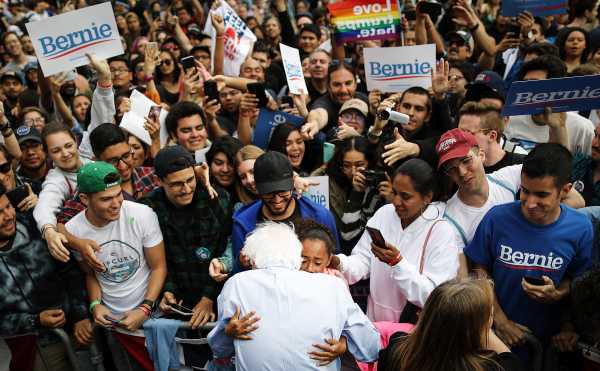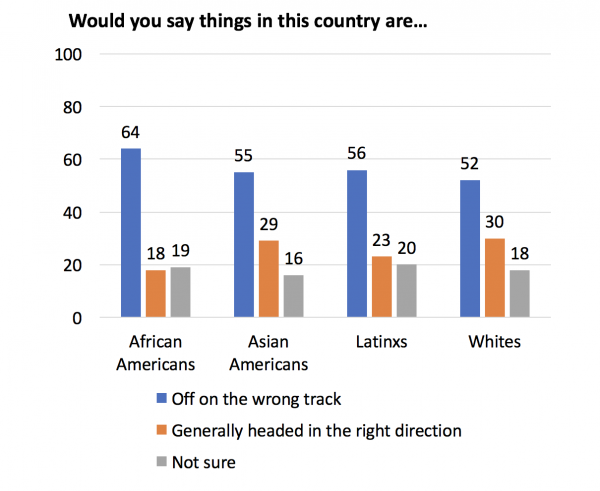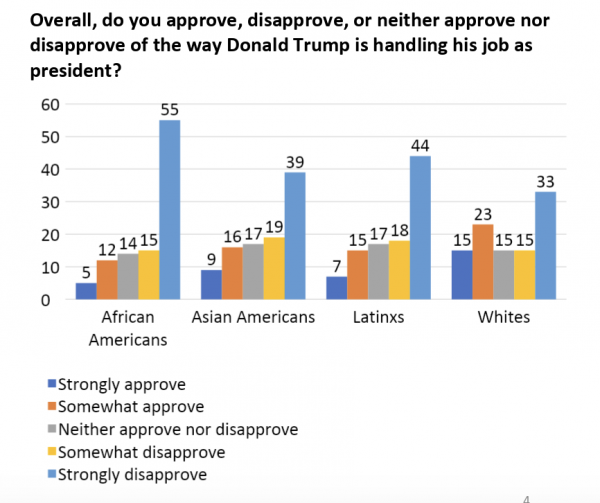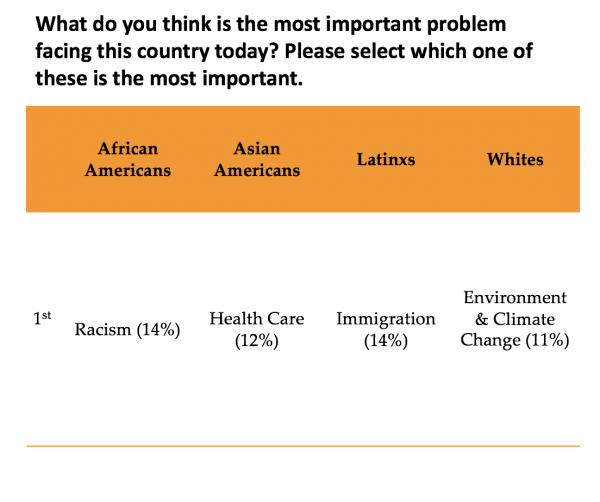
During the 2018 midterms, turnout from Gen Z, millennials, and Gen X narrowly eclipsed that of boomers and older generations, marking the second election cycle in a row where younger voters participated more than their elders. It suggests that as the 2020 election approaches, it will be important to understand the perspectives of young voters and how they differ from older members of the electorate.
A recent survey of adults ages 36 and under aims to do just that, finding significant differences in how young adults from different racial groups are prioritizing political issues and the candidates they support.
The data comes from the GenForward Survey, a University of Chicago-based project that tracks the political attitudes and interests of young people, and breaks those results down by race. Its latest survey finds that young adults, specifically young adults of color, strongly disapprove of President Trump and believe that the country is “on the wrong track.”
Perhaps surprisingly, these young people of color are also currently more likely to support Joe Biden and Bernie Sanders over other Democratic 2020 candidates in the most diverse primary field in party history. However, the level of support for each candidate differs among racial groups, and is also influenced by the issues they’re prioritizing heading into the 2020 election.
As a result, the survey highlights that even as those two candidates — both boomer white men — command much of the attention right now, any candidate looking to mobilize young voters will need to speak specifically about a range of issues, including racism, health care, income inequality, immigration, and the environment.
“In terms of millennials and Gen Z-ers, we’re talking about the largest generation of eligible voters, and the largest share of the workforce,” says Cathy Cohen, the lead investigator and founder of the GenForward survey. “If we’re not paying close attention to how they think about political issues, we are really missing out on what might happen in 2020.”
Young adults feel that the country is “on the wrong track”
The GenForward survey is conducted every few months; its most recent survey was conducted from April 26 to May 8, with 3,257 adults ages 18 to 36 responding. Respondents were asked survey questions on topics like reparations, marijuana legalization, and ending the Electoral College. They were also asked about their opinions on the 2020 race, their support of President Trump and other political figures like House Speaker Nancy Pelosi and Democratic Rep. Alexandria Ocasio-Cortez, and what issues these young adults see as most important for their communities. (To see full results of the most recent GenForward survey, click here.)
The defining feature of the survey is that in addition to polling young white adults, it intentionally oversamples young African Americans, Asian Americans, and Latinos, making it easier to observe how varying racial groups view the same issue.
The results of the most recent survey suggest there are significant differences in how these groups of young people view the current political climate, and that these differing viewpoints are also shaping how young adults view the upcoming presidential election. For example, when asked about the current direction of the country, 64 percent of African American respondents said they believe the US is “off on the wrong track.” Fifty-six percent of Latinos, 55 percent of Asian Americans, and 52 percent of whites said the same.

African Americans were also the most likely to say that the economy is in “somewhat poor” or “very poor” condition (37 percent), compared to 31 percent of white Americans, 32 percent of Latinos, and 29 percent of Asian Americans.
Looking at opinions of President Trump, again, black Americans were most likely to somewhat or strongly disapprove of his performance (at least 70 percent registered some level of disapproval), followed by Latinos (62 percent), Asian Americans (58 percent), and white Americans (48 percent). The majority of young adults across racial groups (76 percent) said they’d like to see Trump have a Republican primary challenger.

But Cohen tells me that while young Americans, and young African Americans in particular, disapprove of the president, that is not necessarily translating into them increasingly identifying as Democrats. For young voters in 2020, “it’s not just their party, but their opposition to the other party that will drive them to the polls,” Cohen says.
Young adults favor Joe Biden and Bernie Sanders
The bulk of the survey focuses on the issues respondents are prioritizing in the 2020 contest as well as the candidates they are currently supporting in the Democratic primary. This is also where the survey finds the most revealing differences between young adults of different racial groups, suggesting that candidates will need to address a range of issues if they are looking to maximize the number of young voters who turn out next year.
Looking at the issues first, the survey finds that younger African Americans reported being most concerned about racism, gun control, and health care. Asian Americans reported being most concerned about health care, gun control, and climate change. Latino respondents reported prioritizing immigration, climate change, and racism. And young white Americans said they are most concerned about climate change, health care, and income inequality.

There’s some overlap between these groups, particularly when it comes to concerns about health care, but it is also clear that different communities have different priorities. “It is very hard to talk about an agenda or issue that all young adults care deeply about,” Cohen tells me. Still, she says, candidates will need to consider “how to be talking about all of these issues instead of just one.”
When it comes to which candidates young adults say they are currently supporting in the Democratic primary, things once again break down differently based on the race of a respondent. The survey shows that across all racial groups, young voters favor former Vice President Joe Biden and Vermont Sen. Bernie Sanders. But the rankings of these two candidates is not consistent across all groups: While African Americans and Asian Americans rank Biden ahead of Sanders, Latino and white voters do the opposite.
Part of the reason for the early support for Biden and Sanders, Cohen tells me, is likely due to name recognition, something that has also been noted in recent polls of black voters of all ages.
At this point in the contest, the instinct “is to pay attention to candidates you’ve seen before and know something about,” Cohen explains. “And then usually there are one to two people who will pique interest outside of that.”
Because of this, it is also worth looking at which candidates are polling directly behind Biden and Sanders, and which groups are supporting these candidates. The survey shows that African Americans and Asian Americans currently rank California Sen. Kamala Harris third, while Latinos are more likely to rank former Texas Rep. Beto O’Rourke in third place. White Americans, meanwhile, are tied between Massachusetts Sen. Elizabeth Warren and South Bend, Indiana, Mayor Pete Buttigieg.
But large numbers of young adults — more than 20 percent of each racial group — say that they want a candidate not currently in the race.
The GenForward survey also asked the respondents to offer their opinions on which issues a candidate would best act on. Again, Biden and Sanders currently see the most support, with African Americans and Asian Americans being the most likely to say that Biden would be the best candidate to handle national security and the economy, while Latino and white voters are more likely to say that Sanders would best handle health care, climate change, and income inequality.
At such an early stage of the primary, it is likely that support for specific Democratic candidates and attitudes and opinions of how they would handle certain issues are very likely to change. As candidates have started to release policy plans, for example, there have already been some shifts in recent candidate rankings, with Warren passing Sanders in some June polls.
Because of this, Cohen cautions that it’s better to track how candidates perform over time, adding that it will be easier to get a sense of how candidates are faring after they participate in party debates in the coming months.
To reach young adults, candidates need to speak to a number of issues
In some ways, the GenForward survey aligns with other recent polls, particularly in its findings on black voters. Polling of black Americans from groups like BlackPAC, the Black Futures Lab, and the Black Economic Alliance have found that black communities are worried about racism, health care, and the economy and are strongly against President Trump, but that they aren’t overwhelmingly lining up behind one candidate.
But Cohen says the GenForward survey also reveals clear differences in how young voters are thinking about some issues and candidates, particularly when it comes to Biden. She notes that at this stage, strong support for the former vice president is far more likely among older voters, and that younger voters don’t seem to be as strongly attached to him as a candidate.
There is a “complexity in how people are thinking about these candidates,” she says. “There isn’t one candidate, at least among millennials, that is dominating.”
Cohen adds that when it comes to the issues young people of color are concerned about, many of these issues either haven’t been explored at all by candidates or candidates could stand to discuss them further. She specifically notes that candidates so far haven’t had substantive conversations on “how to think about and deal with racism,” an issue that young black and Latino voters specifically want addressed.
The GenForward findings suggest that there are a lot of issues motivating young voters in the coming election cycle. If politicians are serious about attracting these voters, they will need to speak to the concerns of different racial groups. They will also need to speak to these groups in a way that shows a deep understanding of the unique ways these issues are impacting their communities.
“These are the generations that are the most racially and ethnically diverse,” Cohen says of younger voters. “If we don’t understand the nuance in opinions among young people of different racial groups, we’re not going to be able to engage them.”
Sourse: vox.com






